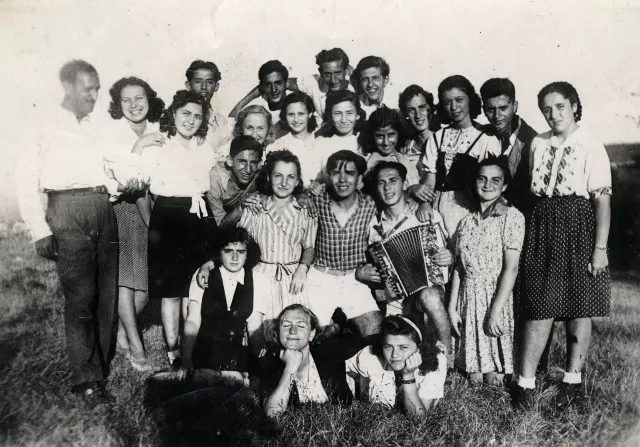Here I am in the center of the row before last, sixth from right to left in the white blouse [behind the man in the checkered shirt]. Around me are Jews who had been interned by the authorities in Sofia during the Second World War. The year is 1943. We are in the ?Kyoshkovete? park in Shumen. First on the left with the white shirt and black trousers is our Ivrit teacher from the Jewish school.
At that time, I was helping to organize the lives of the Jews from Sofia who had been interned during the Holocaust and had subsequently sought refuge with us in Shumen. We decided to organize a full-time kindergarten for the Jewish children in the ?Kyoshkovete? park, complete with breakfast and lunch.
From 1939-1940 onwards, many Jews from Austria and Germany traveled to Palestine along the Danube by ship, stopping off at Ruse and then going to Shumen. They came to the synagogue and we welcomed them with food and money. We also helped organize their onward travel to Burgas and Plovdiv and on through Turkey to Palestine. My father was among those who went to the synagogue and met with them. The whole organization was in fact a secret channel, and he did not speak in front of us about what was actually happening. It was only later that we found out that there were concentration camps and that fellow Jews were being tortured and killed.
The world around us was changing. People started breaking the windows of Jewish shops, our family shops were closed down and insults were written on our walls. Finally we were made to wear badges, i.e., yellow stars. The Turks who lived around our neighborhood suddenly became very vicious and started calling us ?chifuti.? We were even forbidden to travel. During the course of the Holocaust my father went completely bankrupt and even lost his vineyard. The head of the police bought it for an insignificant sum of money, but eventually paid us the real price for that vineyard after 9th September 1944. Imagine that. Haim, my sister Senyora's husband, was also broke. He had a glass shop that was closed down by the authorities. He had no money and was forced to sell his clothes. Every year he was sent to labor camps, as were all healthy, young Jewish men.
In 1943 the Jews interned in Sofia came to Shumen. We emptied the big house and accommodated five families there free of charge. They slept on mattresses in the big hall. Everyone had two square meters to live on, and they kept the space neat and tidy. For meals, they cooked food in a big cauldron. We decided to organize a full-time kindergarten for the children of the Sofia Jews in the ?Kyoshkovete? park, with breakfast, lunch and Ivrit classes included. I was the person who organized this.
As the war went on, I became increasingly restless. I just could not stand still. I had to do something. I was ready to go to the battlefront or become a partisan, even going so far as to prepare my luggage. Six of us ? all girls ? decided to go to the Balkan as partisans, but the leader of the Shumen garrison, who was a brother of one of the girls, laughed at us and said that the partisan war was not for women.
Regina Grinberg and the Jews who were interned in Sofia
The Centropa Collection at USHMM
The Centropa archive has been acquired by the United States Holocaust Memorial Museum in Washington, DC.
USHMM will soon offer a Special Collections page for Centropa.
Academics please note: USHMM can provide you with original language word-for-word transcripts and high resolution photographs. All publications should be credited: "From the Centropa Collection at the United States Memorial Museum in Washington, DC". Please contact collection [at] centropa.org.




















